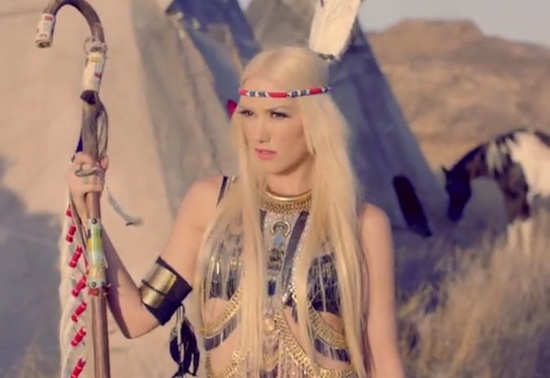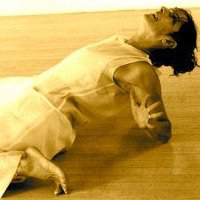“I heard it was supposed to rain this weekend,” says the teacher’s aide as we all file back into the classroom: about 30 teenagers, the aide, and a handful of program facilitators, me included.
We’ve just finished talking with students in this public high school classroom about “-isms”— racism, sexism, heterosexism, sizeism, ageism.
It’s Southern California, three years into a drought, so I say, “Yeah? Great.”
“We should do a rain dance!” she says.
“Yeah!” I say again.
And then I make a sound: a high-pitched hum through slightly parted lips, with the tongue flapping up and down just at the opening of the mouth. The sound lasts maybe one second.
Martin, another facilitator, is part Chicano, part American Indian, and he is huge, muscular, bald and covered in tattoos, many of which have meaning in either or both of these cultures. He is one of the sweetest, softest human beings I know, a man who has devoted himself to serving at-risk youth and who spends a great deal of his spare time caring for his elderly mother—and he is also a fierce political activist who makes a habit of standing up for people who are getting the raw end of the American Dream.
He overhears our conversation and the sound I make at its end, and he does not like what he has interpreted as a moment of cultural appropriation—even of mockery.
“Did you really just make that sound?” he asks me in a low voice, shaking his head. “Right after we finished talking about unconscious racism in small groups…” He’s so pissed that after we finish working with the youth, he brings it up again in our staff de-brief outside.
***
I am a white woman, born into relative privilege. I am politically and socially liberal. I hold two college degrees. I don’t think anyone would suspect me of being racist. What I know for absolute certain, however, is that I am. Racist, that is.
I harbor deeply embedded racist assumptions and insensitivities. They are part of the cultures in which I grew up—that have been and, to some extent, remain part of American culture as a whole.
The best I can do is stay aware of the stereotypes I can’t shake and to flatly refuse to act upon them; to own them when they make it out of my head and into a human interaction and to make amends if they cause offense or disruption.
So, when Martin hears me make that sound; when he hears, in that brief ululation, disrespect and ignorance for a long tradition with deep, sacred roots—a tradition that was brutally eradicated by people who looked a lot like me—I hang my head in shame and apologize.
***
By the end of the day, though, I’m feeling defensive. I take a long dusk walk and gripe out loud to the trees and the birds.
…There was nothing specifically Native American about that sound. I’ve been part of pagan dancer type person rain dance rituals and we danced around with each other and kids and we made many sounds, including The Sound That Got Me In Trouble. Since when do Native Americans have exclusive rights to rain dancing? Are those the only cultures that have danced around and asked for the heavens to bestow them with moisture?
Later, Martin and I sit down together to talk this through. He apologizes for coming down on me so hard, explaining that American Indian culture is profoundly meaningful to him, and that all around him, he sees pieces of that culture imitated without any sense of reverence. To him, this is an act of violence toward that culture—one that has already endured so much, and continues to. He feels duty-bound to step in as its protector.
Martin tells me, “I can’t tell you how many times I’ve seen little kids wearing paper Indian headdresses, and I say something about it to the parent, and the parent says, “Oh, it’s about showing respect!’” I imagine the roots from which the design of any sacred garment arises—honestly, I am not sure that any object in my life has ever garnered a sense of the sacred from me, so I’m really just imagining—and I see that slapping paper feathers onto a paper headband is not a respectful tribute to that garment or the people who created it.
Does that kid with the headdress know what happened to indigenous Americans at the hands of white people? The massacres? The epidemics? Anyone want to talk to her about the continuing plight of the descendants of what were once thriving nations? No? Me neither. And maybe that headdress isn’t so respectful after all.
***
We cannot respect what we do not understand. If we are going to use something from the aesthetic or spirituality of another culture—especially one that has been oppressed, marginalized, persecuted or nearly annihilated by white people, either directly or through collusion—we’d damn well better know more about it than “it just appeals to me” or “I thought it was really cute” or “I think stuff from India is, like, super cool.”
Yes, offense at others’ disrespect for sacred symbols can be taken too far. Two words: Charlie Hebdo.
And there’s a middle ground here. I want to find it.
***
I’ve believed that when I:
…Sweat my way through a “flow yoga” class and chant Sanskrit words I don’t understand at the end
…Wear a handbag or boots with Native American-looking fringe along the top
…Wear Japanese or Indian inspired fashions
…Dance or listen to hip-hop or rap
…I am respectfully drawing something that speaks to me from those other cultures. I’ve believed I was doing what cheery media darling and fellow privileged white chick Elizabeth Gilbert encouraged in this charming rant from Eat, Pray, Love:
I think you have every right to cherry-pick when it comes to moving your spirit and finding peace in God. I think you are free to search for any metaphor whatsoever which will take you across the worldly divide whenever you need to be transported or comforted. It’s nothing to be embarrassed about. It’s the history of mankind’s search for holiness. If humanity never evolved in its exploration of the divine, a lot of us would still be worshipping golden Egyptian statues of cats. And this evolution of religious thinking does involve a fair bit of cherry-picking. You take whatever works from wherever you can find it, and you keep moving toward the light.
The flip side is that when we cherry-pick, we take each and every one of these pieces of cultures out of context. And context, as most everyone knows at some level, is everything.
As Martin talks warmly and passionately about his ancestors and their traditions, I start to feel something I did not expect to feel. I feel…jealous.
A depth of understanding comes packaged with the whole of a cultural heritage. Those Sanskrit words, that leather fringe, the feathered garments, the sari, the bindi, the kimono, the “black” fashion, lyrics or slang—they all come from vast webs of meaning that most appropriators have seen as unimportant.
When I choose the pieces that appeal to me—when I “cherry-pick”—I gravitate toward what appeals to me at my current evolutionary stage and level of consciousness. I’m not really pushing into that liminal space where a truer bitch-slap of awakening can happen. I’m just following the dictates of my ego.
I used to joke that I was a “Hinjew” because I studied and practiced yoga, and because I was ethnically Jewish, and ha, ha, isn’t that cute and kind of edgy that I would say that?
Let’s set aside that actual Hindus would likely not find this cute, and that people belonging to real Jewish spiritual traditions would likely not either. Let’s look at what I may have missed out on in my cherry-picking fervor.
I’ve been missing the depth that comes from an alliance to my own ancestors’ traditions. That depth comes when we do not know, from our egoic, decision-making, control-freaky personal standpoints, what we should do or how we can find peace, grace and equanimity, and we then have a tradition we can fall back on. We have knowing elders to look to.
Truth is, we all have indigenous cultures. Some people, like Martin’s grandparents (American Indians forcibly converted to Catholicism) or Jews trying to escape the clutches of murderous pogroms or the Holocaust (my own ancestors) are forced to renounce their cultures. Others reject the orthodoxy of their indigenous cultures because aspects of it disgust or repel them, or just plain don’t make sense.
A thousand plot lines of a thousand Western films follow this arc. Young people reject crusty old traditions, blaze new trails; parents and communities ostracize or nudge them to within an inch of their lives; and then, those rigid old folks come around, and everyone lives happily ever after. Or not.
And so, modern people are free to parse and piece together “new traditions” (a contradiction in terms if ever I heard one). Privileged white folks throw down our sun salutations, sit in sweat lodges, wear bindis, learn to play Native American flute, or sneak into the back pew at the African-American Christian church because we like the music.
If I want a deep, sacred experience of a cultural tradition, I could look to my own roots. I come from a long line of Eastern European Jews, and our history is no less rich than any other history of a people. Where did we come from? What have we renounced? What can I rediscover and pass on to my Eastern European-Jewish-Irish-Scotch children? What traditions can they discover from the heritage their father has brought to them?
What a cool, deep journey I have ahead of me. We have. Ahead of us. Thanks, Martin.
I can still enjoy what speaks to me outside of my own cultural heritage if I do so in a spirit not of appropriation, but of respectful borrowing. If I am going to appropriate a piece of someone else’s culture, I should seek to understand the context of that piece as much as I possibly can, and to use it in a spirit of respect and reverence. When I enjoy hip-hop music or dance, for example, I’ll remember and learn more about its roots in African culture. Before I unroll my mat to practice yoga, I’ll learn more about the origins of the practice and its context in Hindu history.
All the while, I’ll hold in my awareness that this is not mine; I’m borrowing it. And as I’d do when borrowing anything precious to another person, I’ll handle it with the utmost respect and care.
Relephant:
From the Granddaughter of a Racist.
Author: Melissa Lowenstein
Editor: Travis May
Photo: Video Still








Read 3 comments and reply